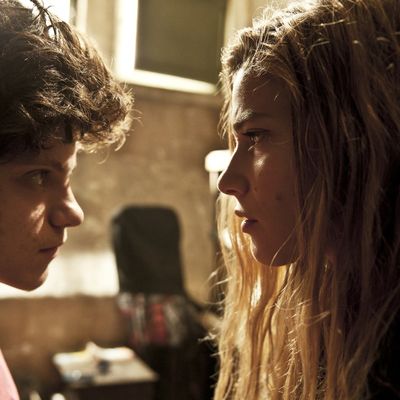
First things first: Bernardo Bertolucci’s latest, Io e Te (Me and You), is, for all its loveliness, a slight film — a bit of a surprise for a director known for making sweeping works about history, politics, and sexuality. (His previous one, 2003’s The Dreamers, was another chamber piece, but even that swung for the fences, taking on the May ’68 riots, the French New Wave, and incest.) But Bertolucci wears the lightness well. The director’s first Italian-language film in three decades, Me and You has the reflection and patience of age, and the fleet-footed energy of youth.
Based on Niccolo Ammaniti’s novel, the film follows Lorenzo (Jacopo Olmo Antinori), a wild-haired, zit-faced teen who pretends to go on a weeklong school ski trip but instead hides out in the storage cellar of his apartment building. At first, he spends his time happily listening to music, reading, and watching his ant farm. Then, however, he gets an unwelcome visitor in his older, estranged half-sister, Olivia (Tea Falco). The beautiful girl acts with sassy confidence, but the truth soon comes out: She’s an addict, and she’s got nowhere to go. Me and You isn’t an addiction movie, however. There’s a more subtle psychic exchange going on here between these two estranged siblings. Each punctures the other’s bubble. Lorenzo learns to let another person in, while Olivia learns to give a shit about herself.
That’s not an original trajectory, but it’s treated with both sensitivity and sophistication. Early on, the camera stays resolutely focused on the driven, determined Lorenzo — head bowed, headphones on, refusing to let the world inside. He’s not an outcast so much as a willing fugitive: When a pretty girl at school asks him if he wants to join her and the others for a joint, he disregards her. Similarly, when we first meet Olivia, we see only a shadowy, fake fur coat stalking in the darkness, like some kind of grim, magical beast out of a fairy tale. The boy is closed off, while the girl has forsaken her humanity.
For all the limitations of its setting and palette, this is a gorgeous, visually exciting movie. In films like The Conformist, 1900, and The Last Emperor, Bertolucci enthralled viewers with his lush tracking shots, his evocative control of shadows and light, the dancerly perfection of his blocking. Like his great predecessors Joseph von Sternberg and Luchino Visconti, he’s a poet of surfaces: Textures and gestures are windows into the soul for him. The director has been in a wheelchair for the past few years, but his visual style still carries a charge. His camera still follows the characters with sinewy long takes, letting different sources of light and dark play across these faces, matching the wild and strange emotions beginning to stir within.
These are intentionally incomplete characters, two sides of the same coin. “If we didn’t have a point of view anymore, we’d be the same,” Olivia tells Lorenzo at one point. “We’d stop being different and accept the world as it is.” For Bertolucci, consciousness and subjectivity have always been a prison: In his earlier films, this kept the individual from collective political action; in later works, it’s become a Zen motif, preventing us from making peace with the world.
Late in Me and You, brother and sister dance together to an Italian cover of David Bowie’s “Space Oddity.” In a breathtaking and thoroughly Bertoluccian moment, they embrace forcefully when the chorus kicks in, as if trying to complete themselves, grasping for emotional equilibrium. It’s a powerful scene, but also a fractured one — not a closure or a resolution, but rather an acknowledgement of their lostness. The director is kind here, though. He lets the anxiety live on in his characters, but by the end of the film, he still finds a way to leave them on a fleeting, stolen smile. There’s a wisdom here, and it’s reflected in the glancing, gentle nature of this film. One can’t help but wonder if, now closer to the end than to the beginning, but also happy just to be directing again, Bertolucci has chosen to give us a beautiful fragment in time, a glimpse of a life just beginning to be lived. Me and You doesn’t pretend to have all the answers, but it feels like the work of a contented man.





